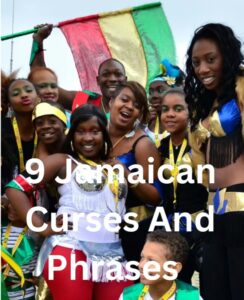
The distinctive language blend known as Jamaican patois, which reflects the cultural diversity of the island is made up of a wide variety of terms, from commonplace words to colourful curses. These language components, which have African, English, and other influences at their core are more than just words, they represent attitudes, feelings, and cultural identities.
This article will examine nine well known Jamaican swear words and expressions, each of which provides a unique perspective on the expressive potential and cultural subtleties of Jamaican speech.
#1: “Mi a go slap weh yuh!”
This expression conveys the unadulterated passion of Jamaican speech, expressing ingrained feelings like rage or impatience. The phrase “Mi a go slap weh” means “I’m going to slap away,” and it conveys both a physical threat and the speakers increased level of anger or irritation.
#2: “Bumboclaat!”
“Bumboclaat!” is a potent profanity in Jamaican patois that can be used to express shock, incredulity, or intense passion. It comes from the term “bumbo cloth,” which refers to sanitary napkins. Because of its adaptability, it can emphasize points in talks, much like English exclamations like “Damn!” and “Oh my God!” do.
#3: “Cho!”
“Cho!” is a shorthand for “Rasclaat,” a term for a cloth worn during menstruation that conveys frustration, dissatisfaction, or disappointment in a clear and concise manner. With its sharpness and directness, it acts as an impactful exclamation point in Jamaican discourse, giving discussions more colour and energy.
#4: “You talk too much!”
This direct reprimand informs someone that they are talking too much or saying things that are not essential. It is a prevalent expression in Jamaican speech which encourage people to speak in moderation or to stop speaking altogether.
#5: “Mi wi box yuh!”
“Box” refers to the act of punching or hitting with an open hand in Jamaican slang. “Mi wi box yuh!” is a direct threat to use physical force that is frequently used to emphasise the speakers sincerity and intent during heated arguments.
#6: “Pickney deh yuh a look fa trouble!”
This statement, which roughly translates to “Child, you are looking for trouble!” cautions against acting provocatively or mischievously. The term “pickney” designates a youngster or young adult, highlighting the parental or authoritative tone used to warn against inciting violence.
#7: “Duppy knows who’s scary!”
Drawing on Jamaican tradition, where “duppy” refers to a ghost or spirit, this expression implies that ghostly beings are selective about who they frighten. It suggests that people should be careful not to offend or provoke others for fear of facing paranormal consequences.
#8: “Cock up yuh foot an’ waan kick dung di whole a creation!”
This striking phrase perfectly captures the essence of an aggressive or destructive person. The expression “kick dung di whole a creation” expresses the desire to wreck havoc on everything in sight, but “cock up yuh foot” indicates to raise one’s foot. It expresses clearly how intense someone’s rage or carelessness are.
#9: “Nuh bodda mi!”
This expression, which means “Don’t bother me!” in translation, expresses the speaker’s wish to be left in peace or unbothered. It’s a straightforward order used to set limits for oneself or to show dissatisfaction when someone disturbs the speaker’s personal space or mental health.
Conclusion
These nine words and curses from Jamaica represent the expressiveness and cultural depth of Jamaican patois. Stemming from a fusion of cultural influences, they are more than just language instruments, they capture feelings, issue alerts, and mould social relationships in a way that is exclusively Jamaican.
These expressions, which preserve and convey the island’s rich cultural legacy, showcase the richness and diversity of the Jamaican language when used in jest or in regular discourse.
